Original link: http://www.cnfeat.com/2022/10/24/ProductivityGuide/

“Personal Productivity Development Guide” integrates all my 7 years of experience in optimizing productivity. Since the first edition in September 2021, it has gone through three major editions and nearly seven or eight minor edition update iterations. The book is divided into 7 chapters , a total of 130,000+ words, to help you improve your efficiency and enrich your body and mind.
This manual will only get thicker and more expensive. Buy it early and benefit from it. The new version is now released, one purchase, permanent update.
Here is an introduction to the guide:
1. How to understand productivity?
Most people don’t understand productivity correctly. The most common productivity guides in the market, the first is the use of efficiency tools, and the second is the method of time management.
Productivity isn’t just about the features and how-tos of a productivity tool, and it’s not just about ticking off a to-do list faster and better.
Many creators follow the method of efficiency tools and use “tools” as the entrance to improve productivity. Although this method is easy and simple, it will be led in the wrong direction by instrumentalism and technicalism, resulting in more focus on a certain function operation on the micro level details, and forget the original purpose and mission of using this tool.
At the same time, under anxiety marketing, time management is packaged as a good medicine to eliminate busyness, making a pile of task lists, trying to maximize the use of limited time, creating an illusion of control over everything, but the fact is that time management itself creates another A form of busyness, covering busyness with busyness, is endless.
What’s even more ridiculous is that when you do time management, you don’t really want to manage time, but just do the right thing in the right way, before you understand what is the right way and what is the right thing, No matter how well you manage your time, your efforts are meaningless without the slightest improvement.
2. How to define productivity?
What is productivity?
You’re reading productivity guides, celebrity biographies, creator interviews, and you might think that there are productive people whose lives are 100% productive, tireless, hard-working, never self-doubt, never waste a minute, but that’s not the case In this way, they will also have hangovers, hesitation, anxiety, emptiness, pain, and idleness. Although they continue to work on the surface, they will also have no confidence in the current progress, and be cautious and walk on thin ice.
In order to write this productivity guide, I read a lot of creator interviews, and let me know that all the creators who look bright are real people, they are also real people, they also have their own difficulties, they do not live in poetry and far away, they live in this In the real world, even if it is difficult to move, it has not stopped.
Kevin Kelly says: Productivity is often a distraction. Instead of looking for better ways to get things done as quickly as possible, look for tasks that you never want to stop.
So, as a normal person, my definition of productivity is: doing important things healthy and long.
Here is the explanation of this sentence –
Productivity is a functioning system based on your understanding of your product, service and self-identity, and then a thoughtful and strategic investment and operation of the time, skills, intelligence, energy, resources and opportunities you have. Don’t seek to maintain the highest speed in everything, but seek to maintain a stable speed in the important things.
Productivity is a set of guiding methods, not only limited to the field of tools and work, you don’t have to pursue more advanced note-taking techniques and tools, and you don’t have to keep yourself busy. The unity of knowledge and action of tools ensures that you are doing the right thing in the right way. Once you’ve actually done the right thing in the right way, there’s no need for time management.
Productivity is a set of ideas for doing things. It is more concerned with the future. How to decide the actions or choices made today, so as to save time in the future? How to accumulate time assets and realize long-term leveraged returns from one-time investment?
3. What is productivity good for?
Alain de Botton’s “The Solace of Art” asks the big question: What is the use of art?
De Botton’s answer is: As human beings, we have many things we want to do, but because of our physical inadequacies, we must resort to tools. We need to cut, but we lack the ability, so we must invent the knife; we need to carry water when we travel, but we lack the ability, so we must invent the bottle.
Not only the body, but also the human mind has deficiencies, which also need tools to make up for it. For example, people’s memory is limited, and we must use painting to help us retain the most beautiful moments; another example, people’s thinking is often trivial, and we must use majestic buildings to make ourselves feel solemn. So art, like any other tool, is used to fill in the gaps so that we can become more wholesome people.
So, what is the use of learning productivity?
We might as well follow the method of Taiichi Ohno, the founder of the Toyota Production System: observe, clear your mind, let go of stereotypes, and ask why five times for everything.
1. Why study personal productivity?
Because I want to increase my personal productivity.
2. Why do you want to improve personal productivity?
Because I want to build a stable and continuous, efficient production method, and output more results in a limited time.
3. Why do you want to produce more results?
Because more results are output, you can enjoy the fun of creation and convert the results into valuable products.
4. Why create valuable products?
Because valuable products can meet the needs of more people, convert them into money, and achieve physical and mental prosperity and a healthy and calm life.
5. Why achieve physical and mental prosperity?
Because this is the free me wow, I can not do what I don’t want to do, I can do what I want to do.
In the past, the perspective of productivity was to achieve a certain efficiency goal, and people were just tools to achieve this goal, such as “30 days of hard work, 3 million sales”, but according to the perspectives of Alain De Botton and Taiichi Ohno, all ‘s personal productivity can be attributed to the three words “I can”. If I can, why not learn and do it? The future is full of possibilities, and I want to realize that possible self.
My present self, and my future self, have a long way to go. I want to increase my productivity, but I just want to move on and unravel that fate card: what would the possible me have been?
As long as I live in an era of civilization and peace, there will definitely be a better production method and better living habits in the future.” A better production environment, a better learning method, and a better cognitive model may be waiting ahead. That is I deserve it, I should.
Yes, the ultimate goal of productivity is not just to help you be more productive, it wants to help you be the best possible self. What you need is not higher productivity or better tools, but a better way of life and work, and a better self.
4. Why do you need a Productivity Guide?
With so many productivity guides out there, who needs another guide on personal productivity?
Most of the productivity guides on the market are tools and skills written by productivity enthusiasts, and most of these productivity enthusiasts have not experienced time stress tests such as giving birth, raising children, and decoration, and it is difficult to withstand the test.
I’m not trying to disrupt the field of productivity or efficiency, I’m just redefining productivity with my actions. This guide does not focus on the specific techniques and applications of productivity tools, but on the fundamental principles behind productivity that have not changed.
Everyone needs it, but this one had better be different, it had better look at personal productivity in a whole new way, and really boost it.
After 8+ years of practice, I have summed up a personal productivity system. I have used this system to write “Stupid Way Culture Handbook”, “Stupid Way Writing” and “Development Writing”. This system can generate value , long-term reuse, to help you realize your grand vision, build personal brand, develop products, build community, create culture, etc.
A good productivity system does not just want to tell you advanced tools and efficient working methods. It is like a compass to prevent you from being carried away by various productivity tools; it is like a river, which can automatically drive you to find the optimal production method. to optimize the tool set; it is like a flame that empowers the creator’s enthusiasm and ignites the maximum value of the tool set.
The contradiction resolved by this system of productivity is the contradiction between the individual’s growing need to become a better possible self and the backward production of the individual.
This system applies the knowledge theory of Sima He, Taiichi Ohno and others, and is composed of product shelf, identity combination, and production method, that is, the triangle theory of personal productivity.
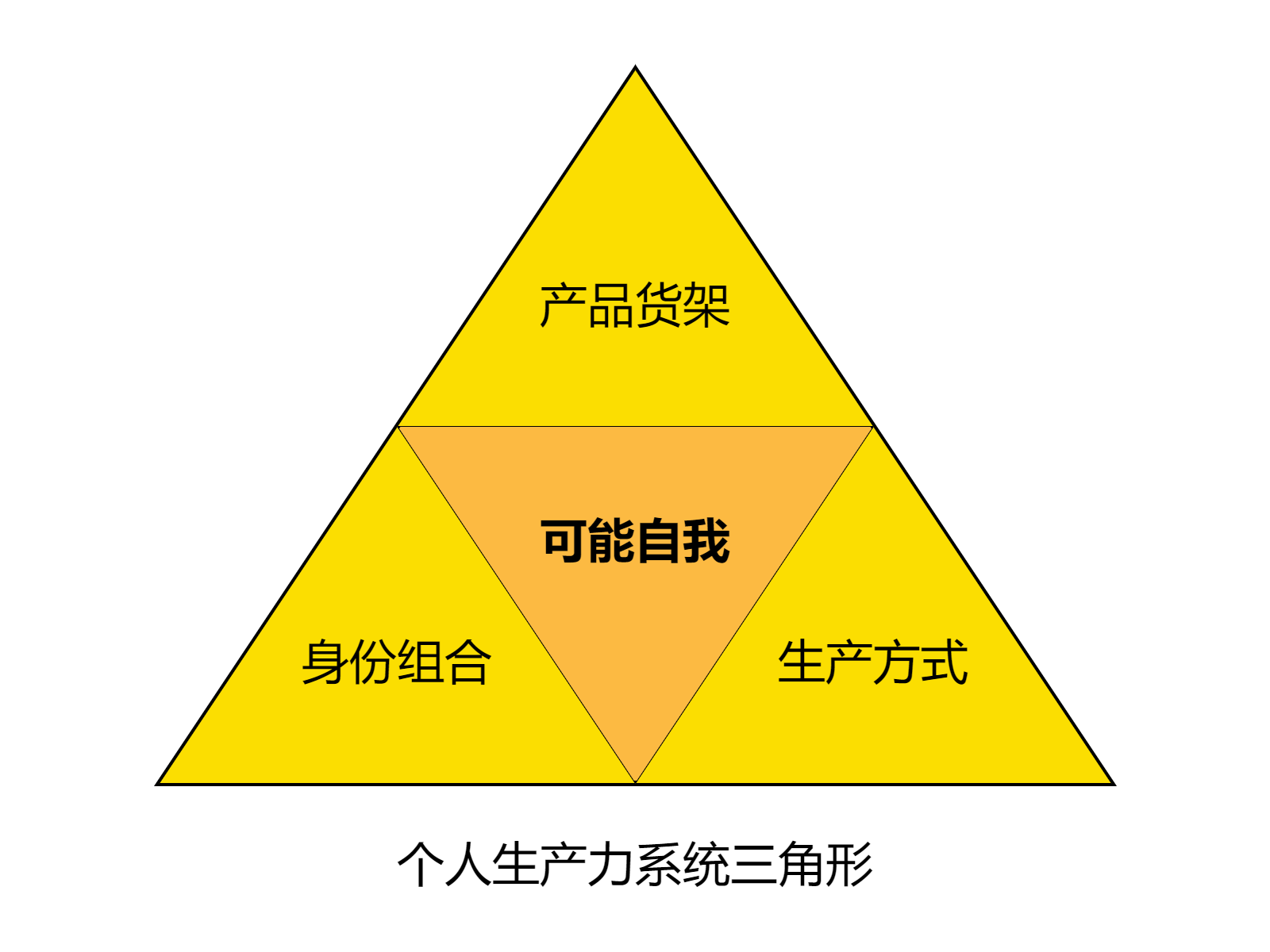
Product shelf is your love for creation, identity combination is your thinking about value, production method is your design of space, maybe self is your expectation for self, the combination of the three can motivate you to think, learn, grow, Continuous improvement, by achieving countless small progress, and exploring better solutions to life problems, make you patient at the macro level, efficient at the micro level, and become a possible self.
This system focuses on the improvement of people-oriented efficiency and the continuous realization of life beliefs. It runs through your entire life and realizes and maintains the following two life states:
1) The present is rich in body and mind, and the future is healthy and calm.
Productivity is the combination of happiness in life, creative flow, excellent work habits and handy tools to achieve a state of physical and mental prosperity.
It includes but is not limited to the following keywords: good sleep, diet and exercise, firm rejection, focus and conciseness, etc.
2) Focus on value creation and become a possible self.
Productivity is the process of bravely facing uncertainty, establishing a sense of self-security, reaching a self-contract, focusing on value creation, and becoming a possible self.
It includes but is not limited to the following keywords: lifelong learning, trans-skills, self-optimization, job distribution, automation, productivity tools, etc.
5. What can you gain?
1. Content Outline
This guide integrates all my 7 years of experience in optimizing productivity. Since the first edition in September 2021, it has gone through three major editions and nearly seven or eight minor edition update iterations. The book is divided into 7 chapters, with a total of 130,000 + word.
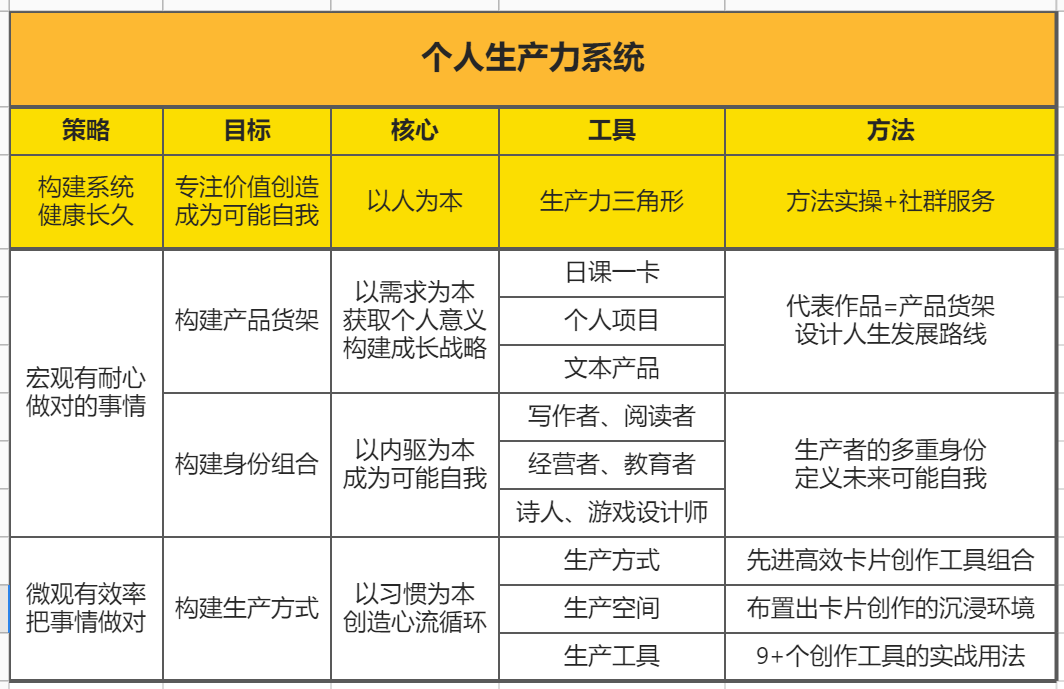
The directory is as follows:
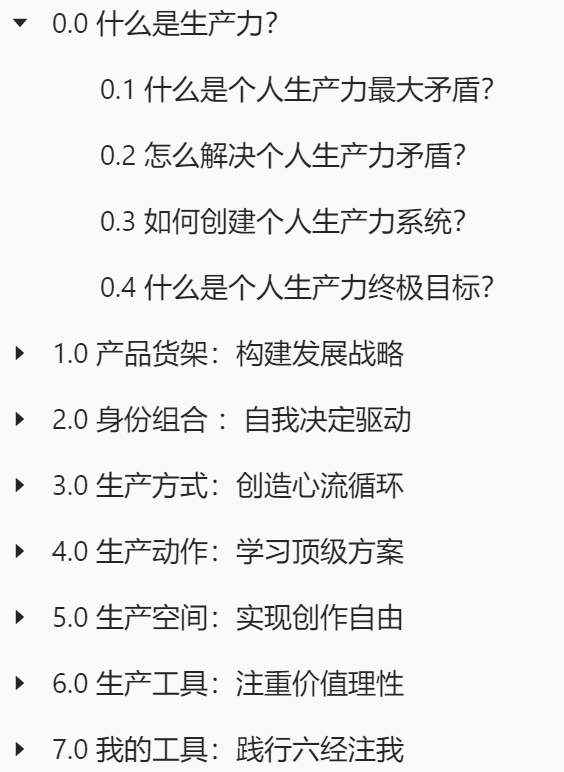
Free trial article: What is the biggest paradox of personal productivity?
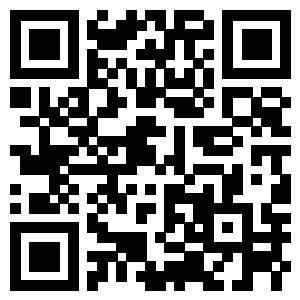
2. Community Services
Buy once, update permanently, and join the manual discussion community. After purchasing, please add WeChat at the end of the article and show the screenshot of the order.
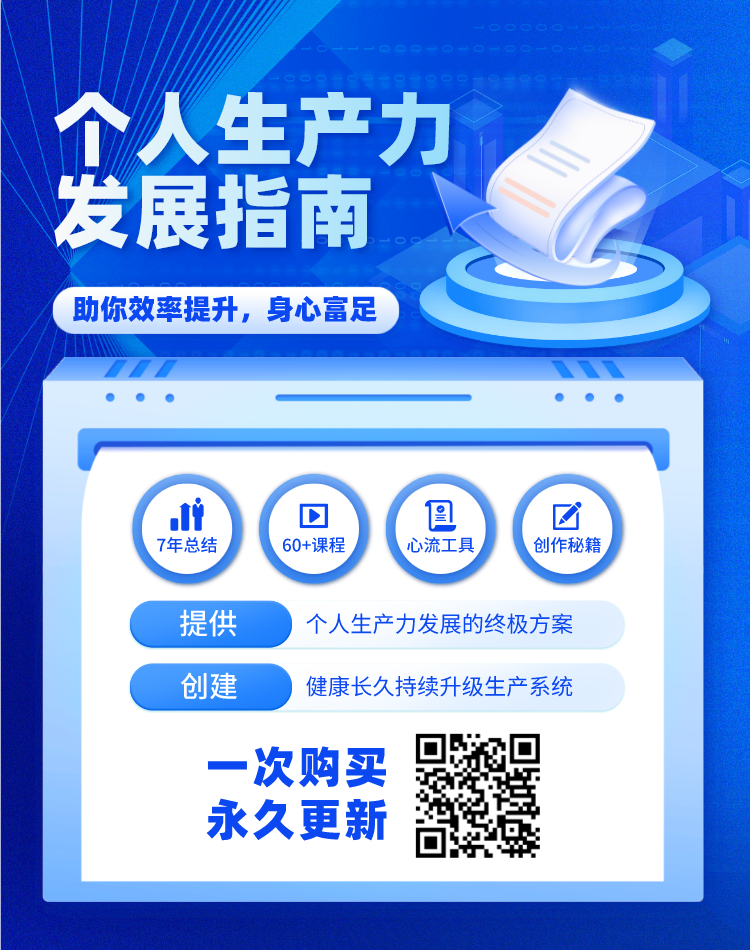
Purchase Notes
- Purchase address: https://cie.h5.xeknow.com/s/2iNUXb
- This guide is a virtual content service, and no refund will be given once the purchase is successful, please understand.
- If you have not purchased any content related to the Stupid Way Lab, it is recommended to search and read the “Stupid Way Culture Handbook” before making a decision.
- This guide is updated with minor editions from time to time, and major editions are updated at least once a year.
- If you encounter any problems, you can add WeChat for help, and I will reply as soon as possible.

This article is reproduced from: http://www.cnfeat.com/2022/10/24/ProductivityGuide/
This site is for inclusion only, and the copyright belongs to the original author.